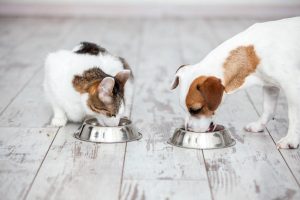Posts Tagged ‘nutritional tips for pets’
Nutritional Tips for Pets
 Providing proper nutrition for pets is crucial for the health and well-being of your pets. Here are some general nutritional tips to ensure your pets receive the necessary nutrients.
Providing proper nutrition for pets is crucial for the health and well-being of your pets. Here are some general nutritional tips to ensure your pets receive the necessary nutrients.
- Consult with a Veterinarian: Before making any significant changes to your pet’s diet, consult with a veterinarian. They can provide personalized advice based on your pet’s breed, age, health status and specific needs.
- Balanced Diet: Ensure your pet’s diet is well-balanced and meets their nutritional requirements. This typically includes a mix of proteins, carbohydrates, fats, vitamins, and minerals.
- Quality Commercial Pet Food: Choose High-quality commercial pet food that is appropriate for your pet’s life stage (e.g., puppy, adult, senior). Looke for brands that list a specific meat source as the first ingredient and meet the standards set by relevant authorities.
- Portion Control: Over feeding can lead to obesity and other health issues. Follow the recommended portion sizes on the pet food packaging and adjust based on your pet’s age, activity level, and overall health.
- Fresh Water Ensure your pet has access to fresh, clean water at all times. Hydration is essential for overall health.
- Avoid Human Foods: Many human foods can be harmful to pets. Avoid feeding them chocolate, caffeine, alcohol, onions, garlic, grapes, raisins, and certain artificial sweeteners like Xylitol.
- Monitor Treats: While treats can be a part of your pet’s diet; be mindful of the quality. Treats should not make up more than 10% of your pet’s daily calorie intake.
- Regular Exercise: Combine a balanced diet with regular exercise to maintain a healthy weight and promote overall well-being.
- Special Dietary Needs: Some pets may have specific dietary needs due to allergies, sensitivities, or medical conditions. If your pet requires a special diet, work closely with your veterinarian to find a suitable option.
- Regular Checkups: Schedule regular veterinary check-ups to monitor your pet’s overall health, weight, and nutritional needs. Adjust their diet as necessary based on any changes in health or lifestyle.
- Transition Gradually: If you are changing your pet’s diet, do so gradually over a week to allow their digestive system to adjust. Mix the new food with the old food in increasing proportions.
Remember that individual pets may have unique nutritional requirements, so it is essential to tailor their diet to their specific needs with guidance from a veterinarian. Here at Olsen Veterinary Clinic, we are committed to the health of your pet. Please contact us at any time with questions.
